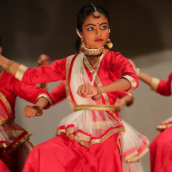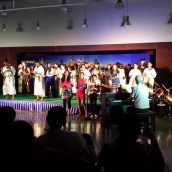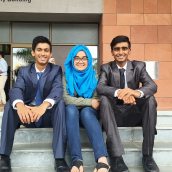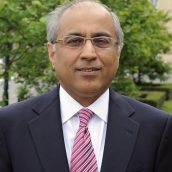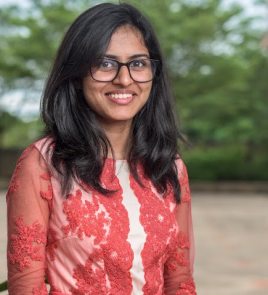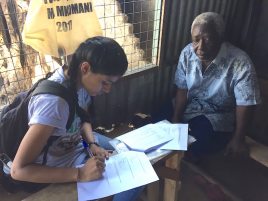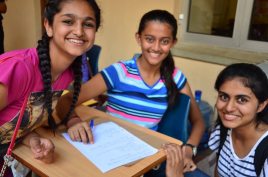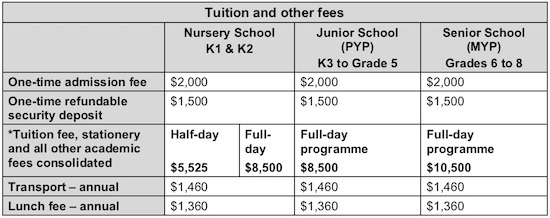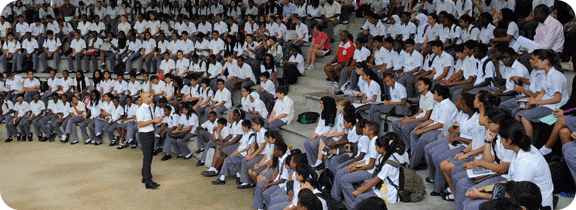
The Junior and Senior Schools
The Aga Khan Academy Mombasa is made up of two schools, the Junior School and the Senior School, which together cater to students from year 1 (age 6) to university entrance.
Junior School
We currently welcome 181 day students in the Junior School (years 1–5), most of whom are from the local area. All Junior School students follow the International Baccalaureate (IB) Primary Years Programme (PYP). Through the PYP, our students learn to be confident, independent and creative learners.
The Junior School building has been designed to address the needs of younger children, with age-appropriate facilities and classrooms. In addition to the PYP classrooms, the building contains the Junior School library, and music, art and information technology rooms. There are also large playing fields and an adventure playground.
Senior School
The Senior School currently houses over 500 students. Those from the local area attend as day students, while those from other parts of the country or region live on campus as part of the residential programme.
Students in the Senior School pursue either the IB Middle Years Programme (MYP) or the IB Diploma Programme (DP).
The Middle Years Programme is for students in years 6–10. It helps them master essential skills and knowledge, and teaches them to be critical and analytical thinkers.
The Diploma Programme is offered to students in the final two years of school. It is an internationally recognised and demanding programme that prepares students for university entrance.
The school caters to both the intellectual and personal growth of students.
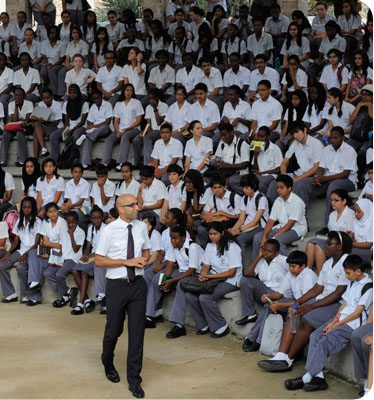
The Senior School has a wide range of facilities that include:
- Laboratories for the sciences as well as for home science and computers
- Art and music rooms
- Library and resource centre
- Religion and culture room
- Career counselling centre
- Design and technology workshop
- Student and teacher lounges
- Theatre
- Multipurpose hall
- Cafeteria and dining area
The building is networked so that computers become common resources for teachers and students. The multipurpose hall can be used for a variety of events ranging from theatre productions to parent-teacher meetings. The school also has swimming, basketball, badminton, volleyball and gymnastics facilities as well as playing fields for soccer, field hockey and athletics.
For further information about applying to any of the programmes offered at the Aga Khan Academy Mombasa, please refer to the admission requirements.
Anahita Aman: Grateful for the Academy’s holistic approach to learning and development
Anahita Aman is in her seventh year at the Aga Khan Academy in Hyderabad. Having started there in grade 5, she is now a grade 11 student in the Diploma Programme. She is wise beyond her years and yet has a youthfulness that is contagious. She is full of hopes and dreams and strives to get the most out of her days at the Academy so that she can ultimately give back to the community and society at large.
For Anahita, the strongest part of the Academy is its holistic approach to student development. “They don’t just focus on the academics but also on sports, music and art – so in that way it’s a really holistic approach to learning, and it’s helped me develop into a multidimensional and multifaceted person,” Anahita says. This holistic approach means that she gets the freedom to explore her passions, and that excites her. She loves music – whether it be singing, playing the keyboard and tabla, or learning Indian dance. She is also a self-proclaimed feminist who is passionate about gender-based violence, gender equality and education for girls. She recently had the chance to fuse these two passions as part of a personal project requirement at school. She wrote, composed, and performed her own songs with powerful messages on these topics.
This year, Anahita made a shift to the residential programme and says that it has been a great learning experience – one that has forced her to come out of her shell. She has learned how to better manage herself and her time, and she has become more independent and more social. “I learned how to adapt to my surroundings, how to adjust with other people and to make things work.” But Anahita feels that she has grown in other ways also, and this stems again from the holistic approach of the Academies.
“Service and action is mandatory as a part of the curriculum…they emphasise the need for community awareness, for concern about society, and they emphasise the need to give back and to make positive and effective contributions to society.” For the service and action component of the Academy’s programme, Anahita was part of fundraising teams that raised money for nearby government schools to install water filtration systems and purchase sports equipment, among other things. “We don’t look at it as an obligation or a compulsion but we do it out of passion, and the Academy gives us that passion, that feeling or need to give back to society,” Anahita says. She is proud of her service accomplishment along with many others that the Academy has also helped her to achieve.
She is a member of the journalism club and has made great strides in her writing skills, including how to better articulate her thoughts. She has taken part in a national sports tournament where she represented her school in football and track and field, having won a silver in high jump. And she has been part of the Model United Nations where she not only got a real sense of how the world works, including how people live and what the prevalent issues are, but also developed skills in public speaking, problem solving and knowledge application. Anahita says, “The Academy helps us apply this knowledge to real-life situations.”
The holistic approach to learning and development that the Academy takes is something that Anahita believes makes it unique. But there are other things too. For one, there is no spoon-feeding. Instead, you’re taught how to learn and how to learn on your own – the approach is not one of rote learning but rather application of real-life situations. She’s also really happy that the Academy creates a safe space. “We have that sense of comfort that there’s no pressure of performing and we have the space to experiment with things. We don’t feel pressure at any point, we don’t feel stressed, and we don’t look at exams as huge challenges but as small barriers that we can overcome.”
Anahita also believes that the Academy’s mission and vision are both important and inspiring. In fact, it was the mission that attracted her parents to send her there. “It teaches us to be culturally rooted and diverse. It teaches us how to accept our differences and so we have this feeling of community,” says Anahita. The Academy also aligns within the framework of the International Baccalaureate (IB) programmes. As such, the attributes of its learner profile are very powerful in instilling life values. All of this is what she believes make it distinct from many other schools.
Anahita credits the Academy for helping her become less shy and less self-conscious. She says, “I feel like I have the comfort to be who I am and to express myself freely. I feel acknowledged and I feel I’m being appreciated for who I am.” When asked if there was any particular person at the Academy that played a big part in this, or whether there was someone she really looks up to, she says that she doesn’t account only one person as a role model but instead looks to the many amazing people she has met along the way for their different but equally important attributes. “I may like someone’s enthusiasm, someone’s hard work and dedication, the way they work with people, the way they bring people together,” Anahita says. “I like to get inspired by these characteristics, by these attributes from different people and imbibe them into myself to be the best person I can be.”
Anahita’s future looks bright. While she is still unsure of what exactly she wants to do, she has learned how to articulate her passion, and that in itself has given her a sense of determination. She hopes to be able to combine her interests in music and literature with humanities and gender studies. She imagines perhaps becoming a poet or musician and incorporating important messages into her work. “I think the Academy is giving me the space and the platform to explore what I’m actually interested in,” Anahita says, “and I think that will lead me to my ultimate ambition.”
By Ceisin Popat
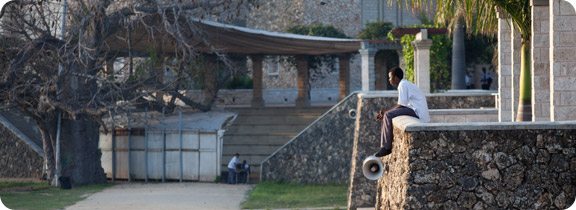
The Aga Khan Development Network
The Aga Khan Development Network (AKDN) is a group of non-denominational agencies that work to improve living conditions and opportunities for the poor across countries of the developing world. Building on an underlying ethic of compassion for the vulnerable in society, the agencies in the Network focus on health, education, culture, rural development, institution building and the promotion of economic development.
Education is a central focus of the AKDN. The Network has been involved in education in the developing world for over a century. Its education programmes cover a wide spectrum of activities, from pre-primary to post-secondary education, teacher training, literacy programmes, school improvement and educational policy reform. The AKDN aims to increase access to quality education for all, particularly those that historically have been underserved or excluded.
The Aga Khan Academies form one arm of the Network's education endeavours. The Academies' focus on developing future leaders is complemented by the work of several other AKDN agencies. Together they provide programming that addresses a range of educational needs across the societies in which they operate. In addition to the Academies, the AKDN's lead organisations in education include the Aga Khan University, the University of Central Asia, the Aga Khan Education Services and the Aga Khan Foundation.
Within the AKDN framework, the Aga Khan Academies exist to both educate exceptional students and disseminate new teaching techniques and learning approaches. Investing heavily in the professional development of teachers is critical to the Academies’ mission of providing students with a rigorous academic and leadership experience.
Learn more about the Aga Khan Development Network, and its work in education and other focus areas, on the AKDN website.
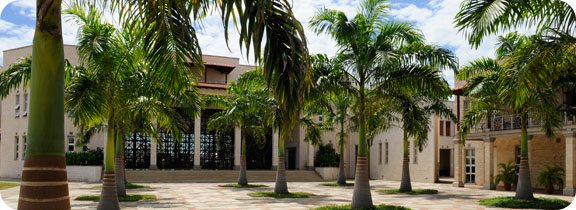
Academy Campuses
The campus of each Aga Khan Academy is architect designed and purpose built, and features exceptional facilities for all aspects of student life. Each campus is designed by renowned architects and is tailored both to meet the needs of the school and to maximise the potential of the site.
Site selection and design
Site selection is a complex process that takes into account a number of factors. These include the urban context of the site, accessibility, infrastructure support and options for long-term expansion.
The site must be able to provide an environment that will be conducive to learning and living. It should also have the potential for creating a space that is inspiring and special for those who live, study and visit there.
The design process for an Academy campus takes into account best practices in facility design. This includes construction techniques that allow spaces to be used for multiple purposes, and classroom environments that are conducive to interactive learning.
Extensive facilities
Each Academy includes the following academic and resource areas:
- age and subject-appropriate classrooms
- well-equipped science and computer laboratories
- library and resource centres
- art and music rooms
- theatre
- design and technology workshop
- multipurpose hall
- religion and culture room
- career counselling facility
- Commons building, which houses the dining hall and an array of spaces for school activities. It is designed to be the hub of student activity, serving as the Academy’s main space for major school functions, including music and drama performances and public lectures.
The sports facilities are extensive and include:
- swimming pools
- sports fields, for example for soccer, hockey and athletics
- gymnasium for indoor sports such as basketball, badminton, volleyball, gymnastics
- tennis court, cricket pitch or ice-skating rink, as appropriate.
Residential accommodation
Residential facilities have been designed to accommodate students and dorm parents (teachers who have been selected and trained to live in the faculty apartments in the student residences).
Accommodation is available for Academy community members from both within the country and overseas, as well as those visiting or on exchange from other Academies. Additional teachers' quarters on campus house both resident and visiting faculty along with their families.

Our Campus
Built on an 18-acre (7.3 hectare) site in the Kizingo area of Mombasa, the Aga Khan Academy Mombasa is a state-of-the-art facility inspired by Swahili architecture.
Our school is the first of a network of about 18 planned Academies offering the highest international standard of education to students in countries across Africa, South and Central Asia, and the Middle East.
The campus has been specially designed by renowned architects and is purpose built. Our facilities include the following academic and resource areas:
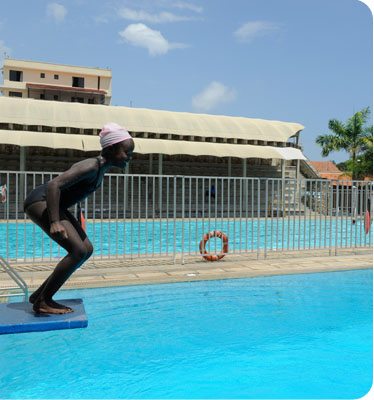
- Subject and age-specific classrooms
- Well-equipped science and computer laboratories
- Library and resource centres
- Art and music rooms
- Design and technology workshops
- Multipurpose hall
- Religion and culture room
- Career counselling facility.
The Commons building houses the dining hall and an array of spaces for school activities. It is designed to be the hub of student activity, serving as the Academy’s main space for major school functions, including music and drama performances and public lectures.
Sports facilities
Our sports facilities are extensive and include:
- Swimming and diving pools
- Sports fields, for example for soccer, hockey and athletics, including floodlight capacity for nightime matches
- Gymnasium for indoor sports such basketball, badminton, volleyball, gymnastics
- Tennis courts
Residential accommodation
Our residential facilities have been designed to house students and dorm parents (teachers who have been selected and trained to live in the faculty apartments in the student residences). Accommodation is available for Academy community members from both within the country and overseas, as well as for those visiting or on exchange from another Aga Khan Academy. Additional teachers' quarters on campus house both resident and visiting faculty along with their families.
We invite you to visit the Academy to take a tour of our beautiful campus.
Dania Quadri (Class of 2014): Giving back as an alumna
“Being part of an open-minded community that encouraged challenging what we were taught, the willingness to accept one another and inspire each other to grow constantly, was very refreshing. I credit these experiences for much of whom I am today.”
– Dania Quadri, Class of 2014
She was also instrumental in helping to organise the Mental Health Awareness Week (MHAW) in September 2016.
“As I aspire to be a doctor, I feel that it is necessary to acquire experience in a role that demands care, patience and a great deal of understanding,” she explains. “I knew teaching and organising the MHAW would contribute to my personal growth and career aspirations but it would also allow me to give back to my school – something very important to me.”
Through MHAW, Dania was able to contribute to reducing the stigma associated with mental illness within the Academy community.
“As a student myself, I know how hard it is for students who are mentally unwell to cope with studies and social life at school," she said. "I wanted to spread awareness about it being perfectly normal to feel mentally unwell, to know the difference between clinical illness and just a rough emotional phase, and to encourage students to seek help and advice if they are feeling low.”
Her internship made her realise she was more passionate about education than she thought. She particularly enjoyed the responsibility an educator has in developing a student’s personality and knowledge.
“As a teacher, it was interesting to observe school from the other side," she said. "Spending time with all the teachers made me realise how much they actually care for their students. The support is incredible at the Academy and different learning abilities are not only understood but truly valued.”
Director's Welcome
Director of AcademiesThe Aga Khan Academies is a network of schools being established by His Highness the Aga Khan.
As the Director of Academies, I have been entrusted with His Highness’s extraordinary vision for the Academies as a global learning community, where young people develop the capacity to become future leaders of civil society.
The underlying idea of the Aga Khan Academies network is to concentrate substantial resources on those exceptional individuals – students and teachers – who have the potential to transform society. When provided with a world-class education, exceptional students from any background can achieve their significant potential and in so doing improve their lives, the lives of their families, their communities, their country and the world.
Each Aga Khan Academy will reach out to students of all backgrounds, regardless of culture, race, religion or financial circumstance.
The Academies follow the International Baccalaureate (IB) curriculum, ensuring a global standard of educational excellence and external validation through the annual IB Diploma exams.
The Academies also work to enhance the quality of teaching, the base on which good education rests. Each Aga Khan Academy will provide professional development programmes for teachers and school leaders from within the Academy as well as from government and other schools.
The students in our existing Academies are already achieving exceptional results across domains spanning academics, athletics and the arts. And our alumni, many of whom attend leading universities around the world, are demonstrating a deep sense of social responsibility and a commitment to return to serve their home countries.
Ultimately, we hope that the qualities of good leadership – sound moral judgment, self-discipline, a pluralistic outlook and civic responsibility – are the qualities that will distinguish Aga Khan Academy graduates.
"Our goal, then, is not to provide special education for a privileged elite – but to provide an exceptional education for the truly exceptional." I invite you to explore our website further to learn more about the Aga Khan Academies and the unique and innovative programme they offer.
With warm wishes,
Salim A.L. Bhatia
Director of Academies
Kamila Janmohamed (Class of 2018): Reflecting on immense personal growth
My four-year journey at the Aga Khan Academy Mombasa came to a close at a much faster pace than I am comfortable with. With graduation having recently taken place, I can’t help but look back at the immense growth I have undergone personally, socially and intellectually during my time here.
The prospect of joining the Academy had always sat passively on the horizon – I had cousins pass through the Diploma Programme here long before me, and a sister who soon planned to make the shift. So, at the age of 14, it didn’t come as much of a surprise when my parents suggested I move with her.
Leaving the comfort of my home and the company of friends with whom I had spent my entire academic career proved a lot harder than I anticipated. Coming from Dar es Salaam, Tanzania, I faced less of a culture shock than many incoming students I would interact with over the years, but this didn’t soften the blow of finding myself in the middle of an entirely new education system. Here I was, an anxious teenager who had long since associated learning with the contents of a textbook, now being introduced to criteria, conceptual understanding and inquiry-based learning, all of which seemed like another language to me. Like most who have been in my position, I felt alarmingly overwhelmed by the sheer magnitude of responsibility I had to take, both for my learning as an MYP (Middle Years Programme) student, and my well-being as a residential student.
I was lucky enough to have a dorm parent that year who was very perceptive to these challenges, and through her support, and that of several of my class teachers, I was able to integrate relatively seamlessly into life at the Academy. I was particularly struck by the attitude towards learning harboured by my peers, many of whom viewed it as a communal effort and helped me adjust to the new system. This culture of intellectual humility is something that I am honoured to have been able to contribute to over the last 18 months, by tutoring MYP students in subjects I found particularly challenging in the programme.
True to the school’s mandate to develop holistic individuals, I was encouraged to join several extracurricular activities, which empowered me to pursue my passion for learning and service. One of these was a community and service group called Learn and Earn, which operated under the residential programme’s weekend activities. As the coordinator for logistics and communication, I helped organise weekly sessions with students from a nearby school where we carried out activities to promote life skills, as well as sell food items that we had cooked together to raise funds for the renovation of their school’s kitchen. This was my first experience with planning and executing a project of such a scale, and it increased my interactions with members of both the school and the surrounding communities. That same year, I was encouraged by my biology teacher to participate in the 2015 Golden Climate Olympiad where my project on cost-effective biogas digesters earned a silver award.
Two years later, I drew on my experiences as a younger, and newer, student at the Academy to fulfil my role as a Dorm Captain. I have viewed this opportunity as one of my greatest ways of giving back to the community I have grown so much in. In addition to organising orientation activities and events for the residential community, my role has required me to serve as a bridge between the students and the teachers. In considering the perspectives of both parties when discussing administrative issues, I have developed a deeper understanding of the importance of good communication and empathy. By playing a coordinative role, I have been able to engage directly with the sheer diversity of the school community. Interacting with individuals of various backgrounds and opinions has taught me the importance of engaging in open-minded and meaningful dialogue, which has enabled me to broaden my horizons. As a student leader, I have come to appreciate the importance of respect for individuals not because of the authority they hold, but simply because of the fact that they are people, a value that resonates strongly with the Academy’s vision.
Learning to balance these responsibilities and my commitments to other extracurricular programs with the demands of the rigorous International Baccalaureate Diploma Programme has stretched my abilities to manage and organise my time. Most of my courses have involved an extensive amount of critical thinking and have taught me not to look at academic subjects as separate entities. This has in part been catalysed by my Extended Essay on the economic implications of stroke, which focused on biology and economics. As a result, I have been able to make more meaningful conclusions from my learning, and to question things better. I am particularly grateful to my English teacher, whose classes stimulated thoughtful discussions about our world and why things are the way they are. Such platforms have been abundant in my time at the Academy, giving me the opportunity to voice my opinions, take on issues that I am passionate about and to develop a strong social conscience that has helped shape my identity.
As I consider what life will be like after graduation, I find myself saddened by the fact that I will soon be in a new environment without the strong network of support from teachers and students I have built here at the Academy. To these people, and my family of course, I owe not only my intellectual growth but also the strong sense of self I have developed. These are things that I hope to carry with me as I move on to pursue a degree in Global Affairs at Yale University, now with a larger family, concentrated in a region of the world I look very forward to coming back to work in.
By Kamila Janmohamed
Fee schedule test
Fee schedule for the 2018–2019 academic year.
![]() Fee Schedule AKA Maputo 2018-19 Eng-Pt.pdf
Fee Schedule AKA Maputo 2018-19 Eng-Pt.pdf
* Does not include transport and lunch fees. A 50% premium will be applicable on tuition fees for international students.
- One-time, non-refundable admission fee is payable for each student enrolling for the first time.
- One-time refundable security deposit is payable upon acceptance of admission. It is refundable when the student leaves the school as long as the required notice has been given in writing and “No dues” clearance is obtained from the school. No interest is paid or payable on this deposit.
- A sibling discount of 5% of tuition fees will be applicable for second and subsequent children.
- Tuition fee may be paid in full with an early payment discount of 3%, if paid before 31 July.
- Tuition fee may be paid in two equal instalments, no later than 31 July and 31 December of each academic year.
- Tuition fee must be paid within 30 days of admission to secure a place at the Academy.
- Tuition fee includes course fees, the use of essential course books, library books, IT structure, science laboratory equipment and certain classroom supplies. This, however does not include school uniform.
- Parents of returning students will be invoiced four to six weeks prior to the new academic year.
- The fees can be paid in US dollars or Meticais. For making payment in metical, exchange rate of invoice date i.e. 15 June and 15 November will be applicable. The Academy however reserves the right to change this policy.
- Parents must provide the finance department (finance.maputo@agakhanacademies.org) proof of payment made through direct deposit or bank transfer even if payment is done by an organisation or a company.
- If a student wishes to leave the school, one term’s advance notice of withdrawal must be given in writing or, in lieu of notice; one term of the annual fees will be due and payable. School clearance will not be possible until an account is settled in full.
- The Academy reserves the right to withheld results, school certificate, transcripts or any other information and/or documents until all outstanding dues are settled in full.
- Students who have been admitted to the Academy, and can demonstrate need, will be considered for financial aid.
- The above terms and conditions may be modified or new terms may apply to reflect changes in the law or our services.
- For further information, please contact us via email on admissions.maputo@agakhanacademies.org.
In the Press
The following articles can be found in the press:
